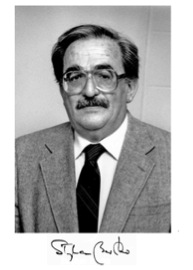Berko Student Research Symposium
 The “First Annual…..” (two words which are always unwise to put next to each other) Student Research Symposium was initiated in 1992 by Professor of Astrophysics and Department Chair John Wardle to honor Professor Stephan Berko, who had died suddenly the previous year. The Berko Symposium is “a great way to close out the academic year,” says Wardle. “We come together to celebrate our students’ research and hear what the different research groups are doing.” Family, friends and colleagues contributed to a fund to support and celebrate student research in his memory. This provides money for the Berko Memorial Prize which the winners share each year. At the symposium, the undergraduate speakers will describe their senior thesis honors research. This is the final step in gaining an honors degree in physics, and many of them will also be co-authors on a paper published in a mainline science journal. The graduate student speakers are in the middle of their PhD research, and will describe their progress and goals. The prize winners are nominated and chosen by the faculty for making particularly noteworthy progress in their research.
The “First Annual…..” (two words which are always unwise to put next to each other) Student Research Symposium was initiated in 1992 by Professor of Astrophysics and Department Chair John Wardle to honor Professor Stephan Berko, who had died suddenly the previous year. The Berko Symposium is “a great way to close out the academic year,” says Wardle. “We come together to celebrate our students’ research and hear what the different research groups are doing.” Family, friends and colleagues contributed to a fund to support and celebrate student research in his memory. This provides money for the Berko Memorial Prize which the winners share each year. At the symposium, the undergraduate speakers will describe their senior thesis honors research. This is the final step in gaining an honors degree in physics, and many of them will also be co-authors on a paper published in a mainline science journal. The graduate student speakers are in the middle of their PhD research, and will describe their progress and goals. The prize winners are nominated and chosen by the faculty for making particularly noteworthy progress in their research.
Stephan Berko was a brilliant and volatile experimental physicist who was one of the founding members of the physics department. He was born in Romania in 1924 and was a survivor of both the Auschwitz and Dachau concentration camps. He came to the United States under a Hillel Foundation scholarship and obtained his PhD at the University of Virginia. He came to Brandeis in 1961 to establish a program in experimental physics and worked tirelessly to build up the department. Together with Professors Karl Canter (dec. 2006) and Allen Mills (now at UC Riverside) he established Brandeis as a world center for research into positrons (the anti-matter mirror image of ordinary electrons).
In a series of brilliant experiments they achieved many “firsts,” culminating in election to the National Academy of Sciences for Steve, and, it has been rumored, in a Nobel Prize nomination for the three of them. Steve was as passionate about teaching as he was about research, and when he died, it seemed most appropriate to honor his memory by celebrating the research of our graduate and undergraduate students.